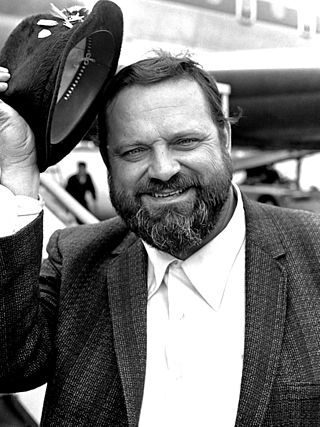
Alois Maxwell "Al" Hirt was an American trumpeter and bandleader. He is best remembered for his million-selling recordings of "Java" and the accompanying album Honey in the Horn (1963), and for the theme music to The Green Hornet. His nicknames included "Jumbo" and "The Round Mound of Sound". Colin Escott, an author of musician biographies, wrote that RCA Victor, for which Hirt had recorded most of his best-selling recordings and for which he had spent most of his professional recording career, had dubbed him with another moniker: "The King." Hirt was inducted into The Louisiana Music Hall of Fame in November 2009. He received 21 Grammy nominations during his lifetime, including winning the Grammy award in 1964 for his version of "Java".
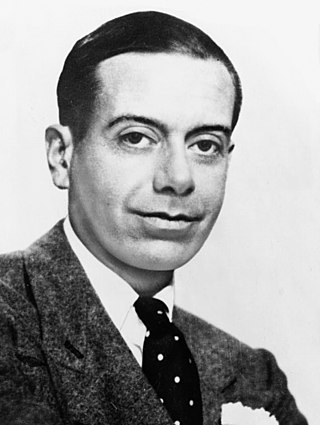
"Let's Do It, Let's Fall in Love" (also known as "Let's Do It (Let's Fall in Love)" or simply "Let's Do It") is a popular song written in 1928 by Cole Porter. It was introduced in Porter's first Broadway success, the musical Paris (1928) by French chanteuse Irène Bordoni for whom Porter had written the musical as a starring vehicle.

"True Love" is a popular song written by American songwriter Cole Porter, published in 1956. The song was introduced by Bing Crosby and Grace Kelly in the musical film High Society. "True Love" was nominated for the Academy Award for Best Original Song. Kelly's contribution on the record is relatively minor, duetting with Crosby on only the final chorus. Nonetheless, the single is co-credited to her.
"Do Nothing till You Hear from Me" is a song with music by Duke Ellington and lyrics by Bob Russell. It originated as a 1940 instrumental that was designed to highlight the playing of Ellington's lead trumpeter, Cootie Williams. Russell's words were added later. In 1944, Ellington's own recording of the song was a number one hit R&B chart for eight non-consecutive weeks and number six on the pop chart.
"Undecided" is a popular song written by Sid Robin and Charlie Shavers and published in 1938.

Young Man with a Horn is an album that was released by Columbia Records in 1950. It features trumpeter Harry James and singer Doris Day performing songs initially recorded for the soundtrack of the film of the same name.
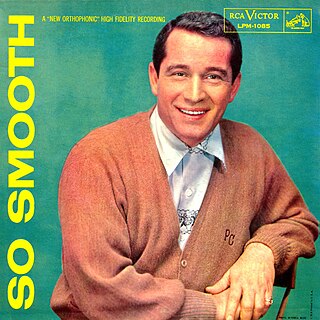
So Smooth is Perry Como's first RCA Victor 12" long-play album, recorded and originally released in 1955. This was also Perry's first album recorded at Webster Hall in New York City, and his first album with the Ray Charles Singers who would support him generally throughout the remainder of his recording career. So Smooth was released in the UK as We Get Letters Volume 2 as Perry's popularity gained international appeal during the late 1950s; under this title, the album peaked at number 4 in the Record Mirror album chart, entering on 28 June 1958 and spending seven weeks within the Top 5.
"I Had the Craziest Dream" is a popular song which was published in 1942. The music was written by Harry Warren, the lyrics by Mack Gordon.

"Al di là" ("Beyond") is a song written by Italian composer Carlo Donida and lyricist Mogol, and recorded by Betty Curtis. The English lyrics were written by Ervin Drake. The song was the Italian entry in the Eurovision Song Contest 1961, performed in Italian by Curtis at the Palais des Festivals in Cannes, France, on 18 March 1961, after Curtis had won the Sanremo Music Festival 1961 on 2 February.
"I Love Paris" is a popular song written by Cole Porter and published in 1953. The song was introduced by Lilo in the musical Can-Can. A line in the song's lyrics inspired the title of the 1964 movie Paris When It Sizzles.
"(You'd Be So) Easy to Love" is a popular song written by Cole Porter for William Gaxton to sing in the 1934 Broadway show Anything Goes. However Gaxton was unhappy about its wide vocal range and it was cut from the musical. Porter re-wrote it for the 1936 film Born to Dance, where it was introduced by Eleanor Powell, James Stewart, and Frances Langford under its alternate title, "Easy to Love". The song was later added to the 1987 and 2011 revivals of Anything Goes under the complete title "You’d Be So Easy to Love".
"Stella by Starlight" is a popular song by Victor Young that was drawn from thematic material composed for the main title and soundtrack of the 1944 Paramount Pictures film The Uninvited. Appearing in the film's underscore as well as in source music as an instrumental theme song without lyrics, it was turned over to Ned Washington, who wrote the lyrics for it in 1946. The title had to be incorporated into the lyrics, which resulted in its unusual placement: the phrase appears about three quarters of the way through the song, rather than at the beginning or the end.
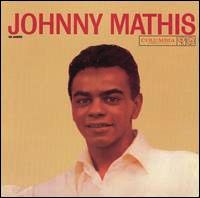
Johnny Mathis is the first studio album by vocalist Johnny Mathis that was released by Columbia Records in 1956. The subtitle A New Sound in Popular Song can be found on the back cover but not on the front of the album or the disc label; in fact, this Mathis LP has been referred to as "the jazz album".

He's the King and His Band is the first album by Al Hirt to be released by RCA Victor. The album was recorded at RCA Victor's Studio A in New York City.
Horn A-Plenty is a big band album by Al Hirt that was released in 1962 by RCA Victor. The album was arranged and conducted by Billy May and performed by a group of top Hollywood session musicians.

Trumpet and Strings is an album by Al Hirt released on RCA Victor. The album was arranged by Marty Paich.

Honey in the Horn is an album by Al Hirt released by RCA Victor. The album was produced by Chet Atkins and Steve Sholes. The Anita Kerr Singers provided the vocals for the album. The backing band on the album consisted of saxophonist Boots Randolph, bassist Bob Moore, guitarists Ray Edenton and Grady Martin, and pianist Floyd Cramer.
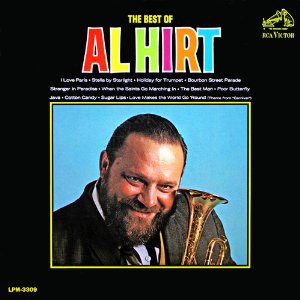
The Best of Al Hirt is a compilation album by Al Hirt released by RCA Victor in 1965. The album peaked at No. 13 on the Billboard Top LPs chart.
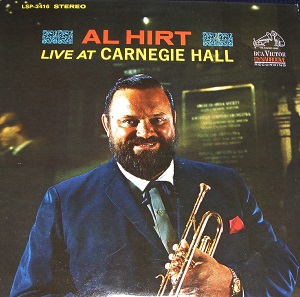
Live at Carnegie Hall is a 1965 live album by Al Hirt released by RCA Victor recorded at Carnegie Hall. The album was produced by Jim Foglesong arranged by Gerald Wilson.

That Honey Horn Sound is an album by Al Hirt released by RCA Victor in 1965. The album was produced by Chet Atkins and arranged by Anita Kerr and Claus Ogerman.













